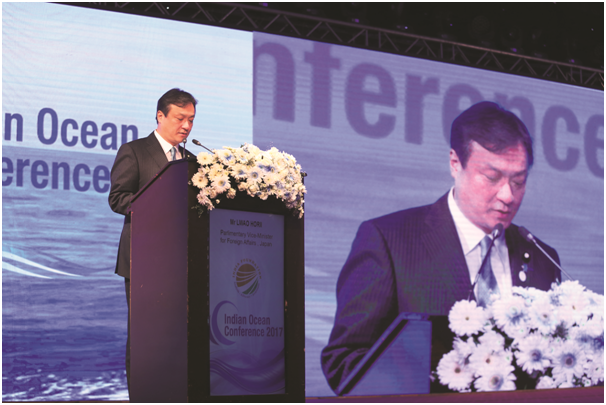The 21st Century is an era led by the Indo-Pacific region. Last year, Prime Minister Abe introduced the “Free and Open Indo-Pacific Strategy.” Japan believes that a key to stability and prosperity of the international community is dynamism which will be generated by combining the “Two Continents,” Asia and Africa, and the “Two Oceans,” the Indian and Pacific Oceans. Toward this goal, the governments and peoples of all countries in the region must continue to make efforts.
Upholding Order Based on Universal Values
First, in order to bring prosperity to the Indo-Pacific Ocean, we must stand for values shared in Asia, such as freedom, democracy and the rule of law. We must stand firm against attempts to challenge those values and spirit.
The North Korea issue is the utmost priority which requires firm actions of the international community. Since January last year, North Korea has conducted two nuclear tests and launched nearly 40 ballistic missiles. North Korea has been continuing provocative actions, including the intolerable launch of a ballistic missile which flew over the Japanese territory.These actions by North Korea are totally unacceptable as they constitute unprecedented serious and grave threats against the security of the international community. Moreover, the proliferation of weapons of mass destruction from North Korea is a serious factor of instability for our region.
The international community must put maximum pressure on North Korea to force it to take concrete action, towards realizing the verifiable denuclearization of the Korean Peninsula. Japan continues to strongly demand North Korea to refrain from provocative actions, including nuclear tests and ballistic missile launches, and to comply with the Security Council resolutions. Another challenge is the growing threats to the rule of law in the Indo-Pacific region. Whether at sea or on land, we observe unilateral attempts to change the status quo by force without respecting dialogue and international law. On the South China Sea issue, in particular, it is essential to pursue peaceful settlement of disputes based on international law, including the United Nations Convention on the Law of the Sea, and demilitarization of disputed features.
To realize free and open Indo-Pacific region based on the rule of law, it is important for all countries in this region to have serious concerns and raise voice against all activities that violate the rule of law.
Enhancing Regional Connectivity
The second important point is enhancing the regional connectivity in a free, open and transparent manner. In order to fully unleash the potential of this region, it is vitally important to connect Japan, Southeast and Southwest Asia by land and ocean. It is to lay a foundation for further smooth flows of people and goods. Japan’s cooperation is not just building roads, railways and ports with its high technology. We also support improvement of cross-border customs procedures and development of areas around economic corridors including Special Economic Zones. In this way, we realize “vibrant and effective connectivity” whereby infrastructure is better utilized.
In particular, Sri Lanka, situated in a strategic point in the Indian Ocean, has huge potential. Japan is ready to cooperate for further development of the Port of Colombo through partnership between the government and private companies that have world-class logistics networks. If progress is made in the construction of the light metro system and the improvement of the environment for private-sector investment, Colombo will become more attractive as a commercial center.
Through Public-Private Partnership, Japan will extend its utmost support to help Sri Lanka become a hub of the Indian Ocean which is truly export-competitive. In order to realize regional connectivity, we need sustainable development based on free and open rules. Development which is inconsistent with the principles of fairness and transparency and lacks economic efficiency or sound finances brings no benefit to the local community. Development based on unfair or non-transparent procedures and fiscally unsound development will leave an enormous burden for future generations and bring no benefits to local communities. It is the people of Sri Lanka who best understand this. Actions that prevent the development and prosperity of Asia must never be accepted.
Capacity Building Assistance
Third, for this purpose, Japan will provide capacity building assistance to the countries in this region. Capacity building to improve the maritime law enforcement capability is particularly important. Japan spares no effort to support coastal states in Asia. To resolve the root causes of piracy, armed robbery at sea, illegal, unreported and unregulated fishing (IUU fishing), maritime crimes and terrorism, Japan will provide seamless support for the countries’ efforts to protect seas. Japan will do it through a combination of various measures, including ODA, defense equipment cooperation, and capacity building assistance.
Japan will work to enhance maritime capability of Sri Lanka by providing two patrol ships through ODA, as well as implementing joint training of maritime law enforcement agencies together with India. With the cooperation of all countries concerned, “Free and Open Indio-Pacific Ocean” will surely be realized.
We, as citizens of the Indo-Pacific region, possess the potential of becoming a role model of the world. The key to unleashing the potential is freedom, democracy and the rule of law. Japan will work together with the international community to champion these important values.
* This article is a summary of the address delivered by Mr. Iwao Horii,
Parliamentary Vice-Minister for Foreign Affairs, Government of Japan on 31st August, 2017, at
the 2nd Indian Ocean Conference at Colombo, Sri Lanka organized by India Foundation.
(This article is carried in the print edition of November-December 2017 issue of India Foundation Journal.)




